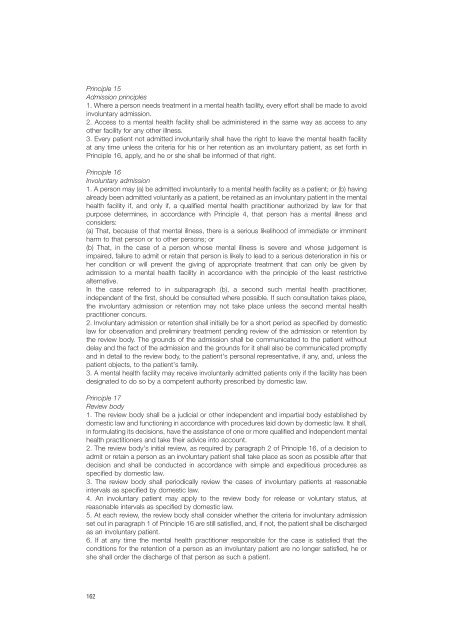human rights and legislation who resource book on mental health
human rights and legislation who resource book on mental health
human rights and legislation who resource book on mental health
Create successful ePaper yourself
Turn your PDF publications into a flip-book with our unique Google optimized e-Paper software.
Principle 15<br />
Admissi<strong>on</strong> principles<br />
1. Where a pers<strong>on</strong> needs treatment in a <strong>mental</strong> <strong>health</strong> facility, every effort shall be made to avoid<br />
involuntary admissi<strong>on</strong>.<br />
2. Access to a <strong>mental</strong> <strong>health</strong> facility shall be administered in the same way as access to any<br />
other facility for any other illness.<br />
3. Every patient not admitted involuntarily shall have the right to leave the <strong>mental</strong> <strong>health</strong> facility<br />
at any time unless the criteria for his or her retenti<strong>on</strong> as an involuntary patient, as set forth in<br />
Principle 16, apply, <str<strong>on</strong>g>and</str<strong>on</strong>g> he or she shall be informed of that right.<br />
Principle 16<br />
Involuntary admissi<strong>on</strong><br />
1. A pers<strong>on</strong> may (a) be admitted involuntarily to a <strong>mental</strong> <strong>health</strong> facility as a patient; or (b) having<br />
already been admitted voluntarily as a patient, be retained as an involuntary patient in the <strong>mental</strong><br />
<strong>health</strong> facility if, <str<strong>on</strong>g>and</str<strong>on</strong>g> <strong>on</strong>ly if, a qualified <strong>mental</strong> <strong>health</strong> practiti<strong>on</strong>er authorized by law for that<br />
purpose determines, in accordance with Principle 4, that pers<strong>on</strong> has a <strong>mental</strong> illness <str<strong>on</strong>g>and</str<strong>on</strong>g><br />
c<strong>on</strong>siders:<br />
(a) That, because of that <strong>mental</strong> illness, there is a serious likelihood of immediate or imminent<br />
harm to that pers<strong>on</strong> or to other pers<strong>on</strong>s; or<br />
(b) That, in the case of a pers<strong>on</strong> <str<strong>on</strong>g>who</str<strong>on</strong>g>se <strong>mental</strong> illness is severe <str<strong>on</strong>g>and</str<strong>on</strong>g> <str<strong>on</strong>g>who</str<strong>on</strong>g>se judgement is<br />
impaired, failure to admit or retain that pers<strong>on</strong> is likely to lead to a serious deteriorati<strong>on</strong> in his or<br />
her c<strong>on</strong>diti<strong>on</strong> or will prevent the giving of appropriate treatment that can <strong>on</strong>ly be given by<br />
admissi<strong>on</strong> to a <strong>mental</strong> <strong>health</strong> facility in accordance with the principle of the least restrictive<br />
alternative.<br />
In the case referred to in subparagraph (b), a sec<strong>on</strong>d such <strong>mental</strong> <strong>health</strong> practiti<strong>on</strong>er,<br />
independent of the first, should be c<strong>on</strong>sulted where possible. If such c<strong>on</strong>sultati<strong>on</strong> takes place,<br />
the involuntary admissi<strong>on</strong> or retenti<strong>on</strong> may not take place unless the sec<strong>on</strong>d <strong>mental</strong> <strong>health</strong><br />
practiti<strong>on</strong>er c<strong>on</strong>curs.<br />
2. Involuntary admissi<strong>on</strong> or retenti<strong>on</strong> shall initially be for a short period as specified by domestic<br />
law for observati<strong>on</strong> <str<strong>on</strong>g>and</str<strong>on</strong>g> preliminary treatment pending review of the admissi<strong>on</strong> or retenti<strong>on</strong> by<br />
the review body. The grounds of the admissi<strong>on</strong> shall be communicated to the patient without<br />
delay <str<strong>on</strong>g>and</str<strong>on</strong>g> the fact of the admissi<strong>on</strong> <str<strong>on</strong>g>and</str<strong>on</strong>g> the grounds for it shall also be communicated promptly<br />
<str<strong>on</strong>g>and</str<strong>on</strong>g> in detail to the review body, to the patient's pers<strong>on</strong>al representative, if any, <str<strong>on</strong>g>and</str<strong>on</strong>g>, unless the<br />
patient objects, to the patient's family.<br />
3. A <strong>mental</strong> <strong>health</strong> facility may receive involuntarily admitted patients <strong>on</strong>ly if the facility has been<br />
designated to do so by a competent authority prescribed by domestic law.<br />
Principle 17<br />
Review body<br />
1. The review body shall be a judicial or other independent <str<strong>on</strong>g>and</str<strong>on</strong>g> impartial body established by<br />
domestic law <str<strong>on</strong>g>and</str<strong>on</strong>g> functi<strong>on</strong>ing in accordance with procedures laid down by domestic law. It shall,<br />
in formulating its decisi<strong>on</strong>s, have the assistance of <strong>on</strong>e or more qualified <str<strong>on</strong>g>and</str<strong>on</strong>g> independent <strong>mental</strong><br />
<strong>health</strong> practiti<strong>on</strong>ers <str<strong>on</strong>g>and</str<strong>on</strong>g> take their advice into account.<br />
2. The review body's initial review, as required by paragraph 2 of Principle 16, of a decisi<strong>on</strong> to<br />
admit or retain a pers<strong>on</strong> as an involuntary patient shall take place as so<strong>on</strong> as possible after that<br />
decisi<strong>on</strong> <str<strong>on</strong>g>and</str<strong>on</strong>g> shall be c<strong>on</strong>ducted in accordance with simple <str<strong>on</strong>g>and</str<strong>on</strong>g> expeditious procedures as<br />
specified by domestic law.<br />
3. The review body shall periodically review the cases of involuntary patients at reas<strong>on</strong>able<br />
intervals as specified by domestic law.<br />
4. An involuntary patient may apply to the review body for release or voluntary status, at<br />
reas<strong>on</strong>able intervals as specified by domestic law.<br />
5. At each review, the review body shall c<strong>on</strong>sider whether the criteria for involuntary admissi<strong>on</strong><br />
set out in paragraph 1 of Principle 16 are still satisfied, <str<strong>on</strong>g>and</str<strong>on</strong>g>, if not, the patient shall be discharged<br />
as an involuntary patient.<br />
6. If at any time the <strong>mental</strong> <strong>health</strong> practiti<strong>on</strong>er resp<strong>on</strong>sible for the case is satisfied that the<br />
c<strong>on</strong>diti<strong>on</strong>s for the retenti<strong>on</strong> of a pers<strong>on</strong> as an involuntary patient are no l<strong>on</strong>ger satisfied, he or<br />
she shall order the discharge of that pers<strong>on</strong> as such a patient.<br />
162

















